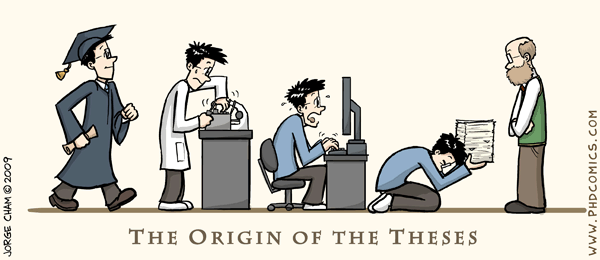Transitioning from PhD to Industry
This piece is currently in draft state. If you have any thoughts, please let me know - contact details are at the bottom of the page.
What does a transition from academia into industry involve? Here are some thoughts
The Journey
It takes a long time to gain a PhD. In 2003, the NSF reported that the median time from registering in graduate school for a physical sciences PhD (including mathematics and computer science) in the US is 6.8 years [NSF]. Combining this with a four year undergraduate degree results in over 10 years of college studying for a PhD. In UK, due to early specialization, the time to completion is lower than most countries [EPSRC (mathematics)], but still remains around 3.5 years. This is following a 3-4 year Bachelor’s degree and often a 1-2 year Master’s degree, resulting in a minimum of 6.5 years, but often, up to 9.5 years.

(Photo from PhD Comics)
My personal experience was a mixture of UK and US education: a 4 year undergraduate Masters at Oxford (MMath) followed by a 2 year postgraduate research at Rutgers (MS), followed by a PhD at Bath which took a little under 3 years to submit. So 9 years of university-level education later, I hand in my thesis, do a little victory dance, and head out to Silicon Valley to start work in “industry” 1.
So after nearly a decade in various incarnations of the same general atmosphere, how is the transition into industry? In a word, to quote Gollum, tricksy.
Getting There and Acclimatization
It can be hard to work out how to convert skills developed during a PhD into actionable skills that are usable in the workplace, and this often results in sort of ‘growing pains’ when you are applying for and starting your first job. I found this hard when interviewing for positions, and even harder to act upon once I started my new job.
I think it is important to play to your strengths and I hope this blog post helps identify what you can focus on. Of course, none of these points require a PhD to be in your skill set, far from it! But if you have graduate-level study, these are areas to think about and consider and key skills to highlight with potential and current employers.
- Intellectual curiosity: embrace it. Prove to your work that this can be very profitable for them. If you’ve completed a PhD, you’re probably the kind of person who’s looked into entire research areas just to satiate a curiosity.
- Analytical thinking: think through problems. Academic work requires thinking obtusely which can be what’s needed to find a market-revolutionizing idea.
- Work drive and battling against the odds: PhDs are hard. You need to have an iron will and belief that, no matter how hard it gets or how hopeless it seems, you will get through and the work will be worth it. There will likely have been times during your PhD you were working on blind faith - the same may be true in industry!
- Independence of learning/working: getting things done. You can take a project and, on your own, learn what you need and execute on it. This can sometimes be tricky as it may go against the standard thinking of the company.
- Long scale thinking: 3 years not 3 weeks. A PhD is all about the long game: you don’t think week by week, but instead focus on long-term progress. This may be weird when you start working on stories for days, or even just hours, but thinking long-scale will help you write sustainable code and build awesome products.
What can you do to improve your acclimatization? Simply being aware can be enough. Also, if you are the first PhD in your department or team then be aware that it can be tricky for both you and your boss to work out how to make your learning style fit.
The downsides of moving into industry?
- Learning is no longer your sole purpose: But use your passion for learning to shape your company’s values or influence your peers.
- Not learning: Very easy to get frustrated and feel you’re not learning. Find other outlets: for me included an online Udacity nano degree, side projects, mathematical/coding puzzles (Project Euler), and reading papers or textbooks (currently Concrete Mathematics by Graham, Knuth, Patashnik).
- Get used to being asked to justify your work: “why do you want to do that?” or “you don’t need to work on that too”.
- Hard to stay up to date in your research field: this is important to do however, even if irrelevant to your job.
Not all bad!
I’ve just listed a lot of difficulties when transitioning into industry. So why do it?
- Opportunity to affect a lot of people: The work you do can quickly be deployed to thousands, if not millions, of people.
- Rapid development: Much quicker than academia.
- Different career progression routes: Not just a single path to progress in your career.
- Better pay: Often better compensation and benefits.
- Interesting and varied problems: You get to work on new problems every day/week/month. Also, the added dimension of considering the end user makes things different.
- Whole new research area: Previously I dealt with algebraic geometry. Now I am looking at video engagement.
Hope this was interesting!
David
-
It would be another 5 months until the viva/corrections/printing was complete and a further 6 months until my graduation ceremony - academia doesn’t rush things! ↩